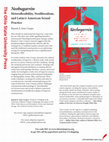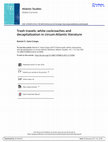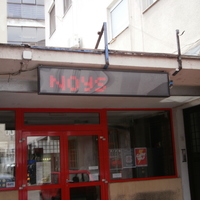Books by Ramon Soto-Crespo

Conflict and Colonialism in 21st Century Romantic Historical Fiction: Repairing the Past, Repurposing History , 2024
This chapter focuses on twenty-first century popular romances set in the Caribbean: British Guyan... more This chapter focuses on twenty-first century popular romances set in the Caribbean: British Guyanese Christopher Nicole’s Manu (2011) and Queen of Glory (2012), Irish Olive Collins’ The Tide Between Us (2019), and Trinidadian Monique Roffey’s The White Woman on the Green Bicycle (2009). These novels, the essay suggests, explore the challenges faced by post-plantation societies that are still coming to terms with the legacy of colonialism and slavery. The essay reads these novels against the tradition of 1970s and 1980s Caribbean popular romance to argue that these lesser and often disregarded body of post-plantation “trash” fiction can offer a more inclusive understanding of the past, contributing – just like their more literary counterparts – to the collective revision of historical interpretation, despite the fact that in all these novels love is thwarted by the damaging legacies of imperialism.
Caribbean Cosmopolitanisms and Caribbean Sciences, 2024
My essay argues that the category of trash is an essential component of a Global South’s cultural... more My essay argues that the category of trash is an essential component of a Global South’s cultural production. More specifically, I argue that studies on Global South’s literature systematically ignore lesser narrative forms when providing their perspective on literary traditions. “The Global South’s Trash” examines how literary traditions are shaped not only by canonical works but also by an understudied stream of pulp fictions whose narratives are set in the Caribbean. In order to prove this point, my paper traces the boom in representations of not quite white characters in Anglophone trash fiction published in the 1970s such as Christopher Nicole’s Sunset (1978).
The White Trash Menace and Hemispheric Fiction, 2020
This introductory chapter analyzes processes of decapitalization in racialized class formations i... more This introductory chapter analyzes processes of decapitalization in racialized class formations in literature.
Love, Language, Place, and Identity in Popular Culture, 2020
Examines archipelagic forms of Caribbean Romance, Race, and Decapitalization
Archipelagic Trash: Despised Forms in the Cultural History of the Americas, 2017

Neobugarrón: Heteroflexibility, Neoliberalism, and Latin/o American Sexual Practice. , 2023
This book breaks open the cramped container of our current sexual categories, revealing the expan... more This book breaks open the cramped container of our current sexual categories, revealing the expanse of possibilities that circulate outside the limits of identity...Most exciting among the book's many contributions to queer studies is its attention to the fact that even nebulous sexualities have external stakeholders, from epidemiologists to filmmakers to sex tourism consumers. A beautiful intervention into Global North sexual categories and their occlusions. "-Jane Ward, author of Not Gay: Sex between Straight White Men "Soto-Crespo sets the stage for a complete rethinking of nonidentitarian, anomalous sexual practices in the Caribbean. Striking the right balance between rigor and provocativeness, gruesomeness and levity, and ambition and evidence, his book is destined to become a canonical work. "-Melba Vélez Ortiz, author of Maatian Ethics in a Communication Context
Papers by Ramon Soto-Crespo

Atlantic Studies, 2016
This essay examines a tradition in Caribbean literature where characters embrace their own decapi... more This essay examines a tradition in Caribbean literature where characters embrace their own decapitalization; it focuses on the circulation of decapitalized whiteness in Caribbean novels that present historical scenarios of cultural devaluation, such as Caryl Phillips' Cambridge (1991) and Robert Antoni's Blessed Is the Fruit (1997). I propose that Phillips' Lady Cartwright and Antoni's Lilla embody the historical emergence of a new character in the Caribbean novel, one in which a decapitalized white subject joins the poor "white trash" communities that had existed at the margins of circum-Atlantic societies. Those communities attest to a forgotten Caribbean past of white indentured labor. Closing with an examination of V.S. Naipaul's non-fiction travelogue A Turn in the South (1989), the essay suggests how the writing of decapitalization extends from the Caribbean to the US South.
This essay examines a tradition in Caribbean literature where characters embrace their own decapi... more This essay examines a tradition in Caribbean literature where characters embrace their own decapitalization; it focuses on the circulation of decapitalized whiteness in Caribbean novels that present historical scenarios of cultural devaluation, such as Caryl Phillips’ Cambridge (1991) and Robert Antoni’s Blessed Is the Fruit (1997). I propose that Phillips’ Lady Cartwright and Antoni’s Lilla embody the historical emergence of a new character in the Caribbean novel, one in which a decapitalized white subject joins the poor “white trash” communities that had existed at the margins of circum-Atlantic societies. Those communities attest to a forgotten Caribbean past of white indentured labor. Closing with an examination of V.S. Naipaul’s non-fiction travelogue A Turn in the South (1989), the essay suggests how the writing of decapitalization extends from the Caribbean to the US South.
MFS Modern Fiction Studies, 1998
This essay attempts a critical reading of the Puerto Rican writers Abniel Marat's drama dios... more This essay attempts a critical reading of the Puerto Rican writers Abniel Marat's drama dios en el Playgirl de noviembre (God in November's Playgirl) and Eugenio María de Hostos's novel La Peregrinación de Bayoán (The Peregrination of Bayoan). My study explores two ...

Retromodernist Horizons: Fin-de-millenium Cultural/Political Imaginaries and the Postmodern Dare ... more Retromodernist Horizons: Fin-de-millenium Cultural/Political Imaginaries and the Postmodern Dare explores the emergence of the Retro at the end of the millennium. Theorizing from the millenary break--a mutation or reconversion, in which the virtual succumbs to the Retro and in which hyperreality collapses into Retro-reality--Retromodernist Horizons analyzes the virulent restoration of Modernism and its imaginary processes of "belonging," as the millennial culture circumvents the philosophical and theoretical dares posed by Poststructuralism.^ At the point at which the "Post" reconverts into the "Retro," Retromodernist Horizons uses the philosophy of Friedrich Nietzsche as an operative lens for its cultural critique in mapping the milieu of the virulent Retro. Starting with the postmodern theories of Jean Baudrillard, Michel Foucault, Jacques Derrida, Sarah Kofman, Gilles Deleuze, Jacques Lacan, and Arthur Kroker, Retromodernist Horizons devises a differ...
American Literary History
Homosexuality and Psychoanalysis, eds. Tim Dean and Christopher Lane, 2001
Textual Practice, 2000
Ramón E. Soto-Crespo 'Scars of separation': psychoanalysis, Marxism and the praxis of loss 1 Cont... more Ramón E. Soto-Crespo 'Scars of separation': psychoanalysis, Marxism and the praxis of loss 1 Contemporary Marxism has forgotten Marx's idea of loss and its possibilities for praxis. Far from being dead and in need of mourning, Marxism allows us to see the subject differently and reveals to us a forgotten relation to loss. This submerged relation to loss is consonant with a loss found in Freud, but subsequently forgotten in psychoanalysis. By addressing loss in Marx and Freud, I aim to establish a new rapprochement between these discourses.











Uploads
Books by Ramon Soto-Crespo
Papers by Ramon Soto-Crespo